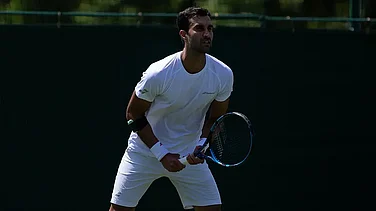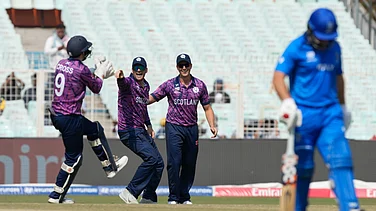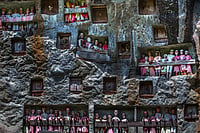‘Anyone who is an East Bengal fan is always right!’
—Ravindran Sriramachandran, Asoka University
During my childhood, I remember a very quiet man from Calcutta who twice visited our Railway Colony apartment in Assam. He was a relation of father’s, and I called him uncle. But I do not remember his name or other details. My only memory of him is his lying in bed, reading the newspaper. Despite being a talkative and inquisitive kid, I hesitated speaking to him. But his strange, fleeting presence persists in my mind, because on both his visits he gifted me a football.
The first one he got me was black and white in colour. I don’t remember much about it. Except that I triumphantly took it to my friends in the neighbourhood, and we played with it every evening, as it slowly lost colour. Only after the leather got torn at too many places did we finally abandon it. I remember the second one better. Not only because I was more grown up by then, but for the ball’s colour. It was red and yellow. That was the jersey colours of my favourite team, East Bengal.
To be gifted a football at a young age teaches you things you may not realise then. A gift is meant to be something you alone possess and have the sole right over. It is what you savour with care. But here was a gift you were dying to share with others. Here was a gift that would be kicked around, get muddied. During the match I would mostly watch others play and wait for my chance. You realise later, a football is a rare gift that is barely yours. It is a gift you gift away, a gift that belongs to others. A football is a gift that teaches you dispossession.
I lived in a neighbourhood mostly comprising Bengali boys, playing football in the school playground near home after school hours. When I fell sick, the boys came asking for me. I had the football after all. I requested them to play on the street before my house. I did the commentary from my window. Those years I only heard matches, never saw them. Matches were happening in big cities like Calcutta. But I was good with the radio, the reason being my love for Hindi film music and discovering the faraway radio stations that played them. It was difficult to catch the Calcutta radio station in short wave during afternoons. Transmission was never stable. The Philips Tiger radio had to be kept at a particular height in a particular direction for better reception. It became even more difficult during rains. Sometimes we would hear the commentator shout ‘Goal!’ without knowing which side scored, and anxiously wait for the moment of jubilation or horror.
In my window commentary during illness, the two teams were always named Mohun Bagan and East Bengal. We lived that rivalry. We, the refugees of football, supported East Bengal. I would follow the inter-club transfers every year with passionate interest. I had a small notebook where I would paste cutouts of players joining East Bengal and photographs of East Bengal’s clinching goals against the big teams. As a fan, I was a big admirer of players like Manoran-jan Bhattacharya and Bhaskar Ganguly, who donned the red and yellow jersey in those years. Ganguly was incidentally recruited by East Bengal in 1976, despite his conceding five goals as the Mohun Bagan goalkeeper in their historic 0-5 loss to East Bengal in the 1975 IFA Shield final. Despite not having seen them in real, but only in newspaper clippings, players like Surajit Sengupta, Gautam Sarkar, Bidesh Bose, Mihir Bose and Krishanu Dey were household names. We debated their skills, sometimes across and sometimes beyond club affiliations.
When I was growing up in the late ’70s, football in India was all about the famous clubs that played the game. There was no nationalism around football, unlike in cricket. Clubs were everything. We were not only familiar with teams and players from outside Bengal, but had huge respect for JCT Punjab, Andhra Pradesh Police and the two dynamic clubs from Goa—Dempo and Salgaocar. Xavier Pius, who was from Kerala, and Ulganathan, from Tamil Nadu, both of whom played for Mohun Bagan, were a welcome change from the usual Bengali names playing for Calcutta teams. I was particularly wary of Ulganathan, who was a wily scorer. Though, historically, it was the other fancied club from Calcutta, Mohammedan Sporting, and East Bengal who begun the trend of playing outstation players much before Mohun Bagan did. Playing for East Bengal, Shyam Thapa’s goal against Mohun Bagan of a back volley in the Calcutta League was folklore. Praised by Pele when Cosmos played Mohun Bagan in Calcutta in 1977, Hyderabad’s Mohammed Habib said in his 15 October, 2016, interview to the Bengali daily, Ananda Bazar Patrika, that he regards his old team, East Bengal, as his mosque where he received Allah’s blessings. He now suffers from Alzheimer’s.
My favourite outstation footballer of all times is Majid Bishkar, who was part of the Iranian team in the 1978 World Cup, and was East Bengal’s star player in 1980. I had a poster of him in curly hair above my reading table. The moment an outstation player joined East Bengal, he was as intimately loved and eulogised as any local hero. Majid later joined Mohammedan Sporting, a team I supported in their matches against Mohun Bagan. The intense rivalry with Bagan for East Bengalis came from the refugee sentiment that revolved around language. Once, after an East Bengal victory against Bagan in a Calcutta League match, the special Bengali radio news programme that used to appear at 10.15 pm had fans exuberantly proclaiming in the ‘East Bengali dialect’ (used as a pejorative by old Calcuttan Bengalis), “Amra jitsi!” (We won!). My elder brother remarked, “This is unthinkable from a Calcutta radio station.”
Since the anti-foreigners movement started in Assam during the winter of 1979, not only did the Calcutta teams stop coming to play for the Bordoloi Trophy, it also ended our evening games at the school playground. There were frequent curfews. We had to restrict ourselves to playing in the narrow lanes of the neighbourhood. Football suffered the divisive machination of communal politics. The refugees of football were once again accused of being outsiders, people carrying the stigma of being on the wrong side of a territorial dispute. A nation’s rules are so much worse compared to the liberating rules of football. No wonder the not-so-famous goalkeeper, Albert Camus, had said in 1957, among all his experiences, what he knew about ‘morality and obligations’ he owed ‘to football’. Football is Marquezian, Alejo Carpentier’s world of ‘marvellous real’. If there was any flash of magic in post-Enlightenment Europe, it could be found either in surrealism or football. Football runs in the opposite direction to the way Kant defined the Enlightenment. It is a game where chance scores over reason, where chance scores, not reason. Football is a game of dissolving maturity, adulthood at play, a space of mischief and genius, where rules allow what they disallow. The dream of a goal signifies a forbidden place to be penetrated without violence and left unconquered. Football defines a strange territory where the magic of becoming can take place.
That is why it is sad when Rana, a young football player who lived close by in the Railway Colony, who chose to play for his club, White Dragon, against the team from his neighbourhood, was slapped and abused by a gang of boys while returning home after the match. The gang tried to mark Rana’s territory and teach him the wrong lessons of loyalty. Loyalty is love, and love is a matter of the heart. The refugees of football, struggling against a politics that tried to ridicule their possibilities, were violating their own necessity to be free.
In the end, I imagine if football existed during Vyasa’s time, the battle of Kurukshetra could have been decided by a match between Kauravas and Pandavas. The trophy would have been the kingdom of Hastinapur. Before the game, Krishna would explain the Gita of Football to Arjuna, that football is maya, scoring a goal is the mind’s delusion and the ball is the metaphor of an evanescent universe.























